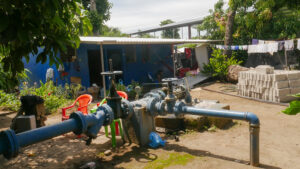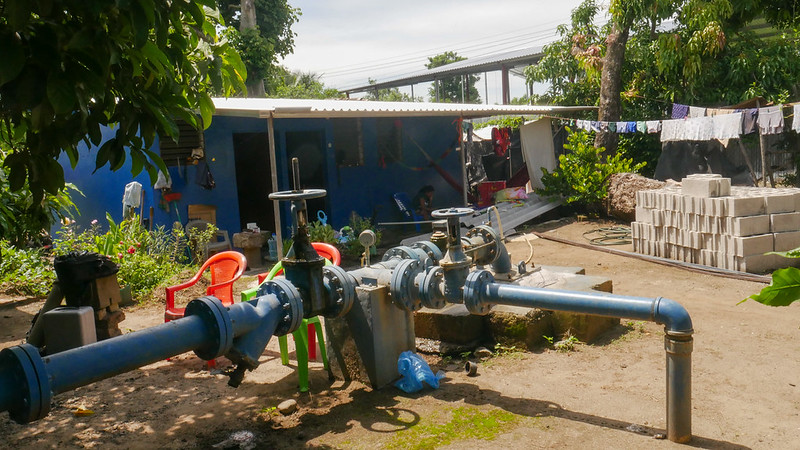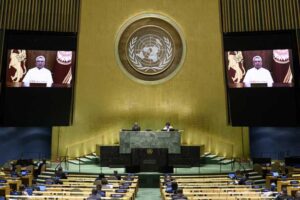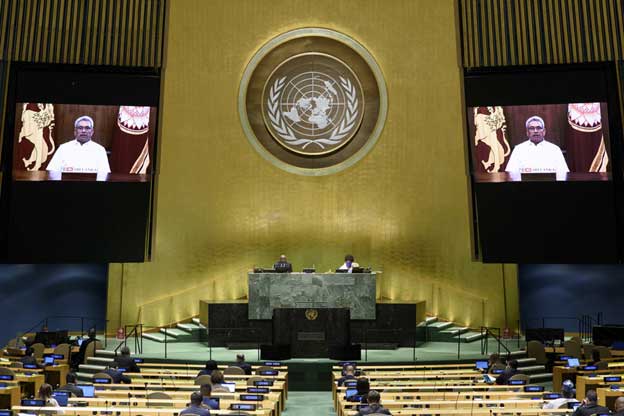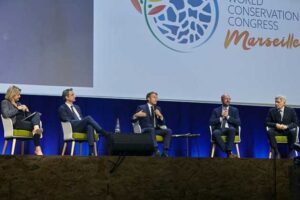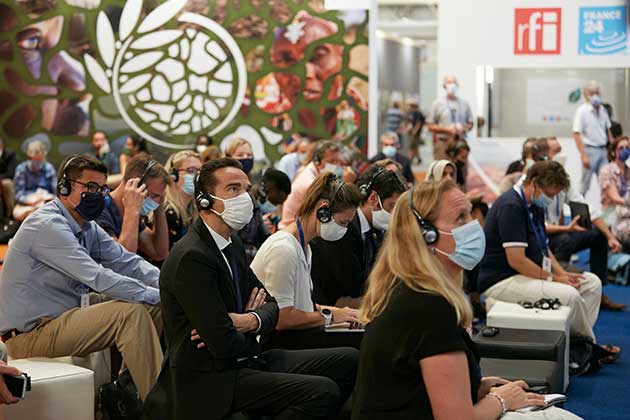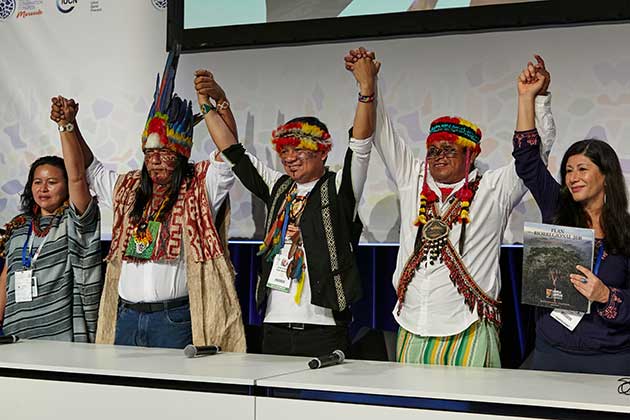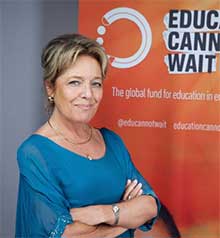
Armed Conflicts, Civil Society, Climate Change, COVID-19, Development & Aid, Education, Education Cannot Wait. Future of Education is here, Environment, Gender, Global, Headlines, Health, Human Rights, Humanitarian Emergencies, Migration & Refugees, Poverty & SDGs, TerraViva United Nations
– “Now is the time for a stronger, more networked and inclusive multilateral system anchored in the United Nations,” said UN Secretary-General António Guterres in his latest report “Our Common Agenda.” Indeed, there is a fork in the road: we can either choose to breakdown or to breakthrough.

Yasmine Sherif
Making this moral choice and adopting this legal imperative is more relevant today than ever. The estimated 75 million children and adolescents caught in emergencies and protracted crisis who suffer from disrupted education has now dramatically increased from 75 million to 128 million due to the pandemic. These vulnerable girls and boys are now the ones left furthest behind in some of the world’s toughest contexts, in Afghanistan, the Middle East, Sub-Saharan Africa and South America.
The current education financing gap amounts to US$1.48 billion for low- and middle-income countries. A gap that is increasingly widening. In reviving the multilateralism that is so urgently needed, the UN Secretary-General will convene a crucial, timely summit on Transforming Education in 2022.
Despite all that we do, despite all our investments, we cannot win ‘the human race’ unless we invest in our fellow human beings, now. It is the children and young people impacted by armed conflicts, climate-crisis induced disasters, forced displacement and protracted crises who are in a sprint against time, with their lives and futures on the line.
We can no longer let “an entire generation facing irreversible losses be left behind in the ruins of armed conflicts, in protracted refuge, on a planet whose climate-change threatens us all,” as the UN Special Envoy for Global Education and Chair of Education Cannot Wait’s High-Level Steering Group, The Rt. Hon. Gordon Brown stated at the launch of Education Cannot Wait’s Annual Results Report: Winning the Human Race, on 5 October 2021.
Education is the foundation, the DNA and the absolute prerequisite for achieving all other Sustainable Human Development Goals and Universal Human Rights. Education means investments in the limitless possibilities of human potential: the workforce, governance, gender-equality, justice, peace and security.
“Access to quality education is key to addressing 21st century challenges, including accelerating the fight to end poverty and climate change,” says The LEGO Foundation’s new CEO, Anne-Birgitte Albrectsen, in this month’s ECW Newsletter high-level interview.
The time has come to connect the dots between individual human beings and our collective humanity and life on this planet. We are now investing more and more in Mother Earth through significant climate change financing. We must now also invest in the human beings populating the planet. The correlation between the positive impact of education upon on all aspects of life on the planet is indispensable and inescapable.
- • Higher education levels lead to higher concern for the environment, and adaptation to climate change. If education progress is stalled, it could lead to a 20% increase in disaster-related fatalities per decade.
• Education is the one unique investment that can prevent conflict and forced displacement. High levels of secondary school enrollment have been shown to be associated with an increase a country’s level of stability and peace and reduce crime and violence.
• Every additional year of schooling reduces an adolescent boy’s risk of becoming involved in conflict by 20 percent. This effect reflects both education’s economic benefits and its role in social cohesion and national identity.
• Conversely, lack of education often leads to political disempowerment and regression to group allegiances. Across 22 countries in sub-Saharan Africa, sub-national regions with very low average education had a 50 per cent probability of experiencing the onset of conflict within 21 years, while the corresponding interval for regions with very high average education was 346 years.
• Education is also the most secure means of ending extreme poverty. For nations, each additional year of schooling can add up to 18 per cent to GDP per capita. For individuals, one more year of education brings a 10 per cent increase in personal income. If all children were to learn basic reading skills, the impact would be 171 million fewer people living in extreme poverty. *Footnotes below.
Education Cannot Wait is a multilateral global UN fund. Our Annual Results Report of 2020, Winning the Human Race, launched at the UN in Geneva this month, testifies to what we can achieve when we think and act multilaterally: when we connect the dots, become one, and act for all.
Through multilateralism, we reached more than 29 million crisis-affected girls and boys in 2020 alone through ECW’s COVID-19 emergency response, working with our strategic partners, including host governments, our 21 donors, UNICEF, UNHCR, UNESCO, UNDP, WFP, our civil society partners, such as INEE, Jesuit Refugee Service, AVSI, Save the Children, Plan International, Norwegian Refugee Council, International Rescue Committee and numerous local civil society organizations across 34 countries. Through joint programming, we were also able to jointly deliver quality education to more than 4.6 million children and youth, of whom 51% were girls and adolescent girls, 38% were refugees – all while we increased ECW allocations to children and youth with disabilities.
This is made possible because ODA governments, private sector and philanthropic partners are scaling up their support for the catalytic ECW global fund whereby their investments are part of multilateral efforts that work as closely as possible to those we serve, establishing links conducive to numerous, diverse SDGs and human rights. The full list of our 21 generous donor partners can be found at the end of this Newsletter.
In connection with the UNGA week this year, ECW strategic donors advancing multilateralism, such as Germany, the United States, the European Union/European Commission, France, The LEGO Foundation and Porticus took giant steps and committed $138.1 million to ECW, bringing the total resources mobilized thus far in 2021 alone to $156.1 million and the total since ECW’s inception to $1.85 billion ($827 million mobilized for the Trust Fund; and, over $1 billion worth of programmes aligned with ECW MYRPs, as leveraged by ECW with partners).
Furthermore, the Global Hub for Education in Emergencies celebrated its new collective space under the ECW umbrella in Geneva, thanks to Switzerland which is the second biggest UN capital for humanitarian and development actors after New York City. The Global Hub brings together NGOs, the UN, academia, foundations, and governments to inspire more commitment and resources to quality education for those left furthest behind in emergencies and protracted crisis.
Multilateralism through the United Nations works.
Still, this is just the start of a major global effort to work through the multilateral coordination system to reach those left furthest behind and bring education from the margins to the center. Based on empirical evidence, ECW calls for an additional $1 billion to contribute to an innovative model that has proven to work.
Political leaders, governments, private sector, UN and civil society – all part of ECW’s multilateral UN system – recognize that education is a precondition for achieving the Sustainable Development Goals and Universal Human Rights. Together, we think long-term and act now. Together, we connect the dots and see things from afar and within. Together, we work on what the world needs most right now: A Common Agenda to Win the Human Race.
Yasmine Sherif is Director,
Education Cannot Wait
The UN Global Fund for Education in Emergencies and Protracted Crises

